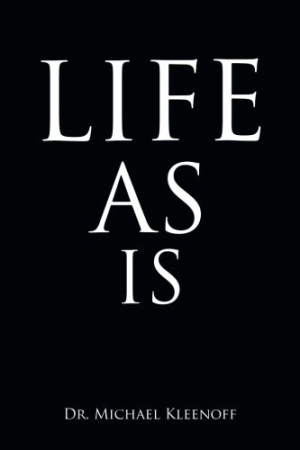Life As Is
This book is partly an intelligently organized and fascinating survey of religious and scientific responses to the unknown.
Soviet expat and accomplished physician Michael Kleenoff returns with a hefty “philosophical memoir” that explores the ways human beings have reckoned their place in the universe. Life As Is begins thoughtfully and stands to intrigue an audience of seekers.
Life As Is is really split into two separate books. Approached independently, each stands to provoke very different reactions. The first of these books is an intelligently organized and fascinating survey of religious and scientific responses to the unknown.
Scientific approaches to concepts like the soul lead into presentations of religious traditions from their origins, with Eastern traditions receiving first treatment. Kleenoff weaves critiques into his histories, presenting theological concepts while pushing against them. Provocative questions—regarding karma and rebirth, the concept of God incarnate, and the infallibility of the Koran—are raised in turn.
His prose is confident and incisive, marked by the same humility and curiosity that characterize introductory sections. Explorations of scientific concepts at the center of contemporary discord between science and religion, including evolution and the big bang theory, conclude this intriguing, informative first portion. Intentional open-endedness adds to the section’s appeal. “We are born miraculously. We die miraculously. And between these two phenomena, we live our lives trying to understand the miracles that [befell] us.”
Yet the authority that Kleenoff establishes in the first half is undermined considerably by portions of the second half that concern themselves with human society and become lost in a quagmire of prejudices. Kleenoff begins from a scientific position, discussing genes in relation to human behavior. Yet this quickly becomes unscientific work, its tone accusatory and its conclusions disturbing. Chapters on social morals are patchwork and anecdotal, particularly where sexuality is concerned.
The unquenchable curiosity that characterizes the first half of the work is absent here, with Kleenoff seeming to take degrees of social stasis for granted. “There is such a thing as the norm of social decency and tolerance,” he writes, and “those who make themselves outcasts [do so] by differing from these norms.”
LGBT Americans are counseled to be thankful for what they’ve already gotten, and feminists to consider how hard men have it. Jews, who “love money” are empathized with, but are told to “be modest … and to stop bragging” for the sake of survival, and to consider whether there’s any validity to anti-Semitic attitudes. Black Americans receive similar “empathy,” with supposed racial traits like laziness either dismissed as fallacious, or attributed to African heredity or PTSD.
Such sections are presented as working against prejudice, which makes their declarations all the more confusing to approach. A failure to synthesize these surveys into satisfactory final conclusions regarding human society further works against the cohesiveness, and attractiveness, of the final product.
The first half of Life As Is is remarkable for the elegance with which it balances religious and scientific questions, and should be rewarding reading for adherents and doubters alike. For all of its ambition and erudition, though, a messy final half leaves Life As Is treading water. Taken in toto, it may confuse the very audiences it initially courts so successfully.
Reviewed by
Michelle Anne Schingler
Disclosure: This article is not an endorsement, but a review. The publisher of this book provided free copies of the book and paid a small fee to have their book reviewed by a professional reviewer. Foreword Reviews and Clarion Reviews make no guarantee that the publisher will receive a positive review. Foreword Magazine, Inc. is disclosing this in accordance with the Federal Trade Commission’s 16 CFR, Part 255.

